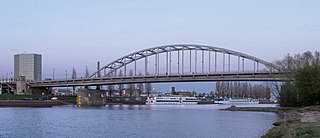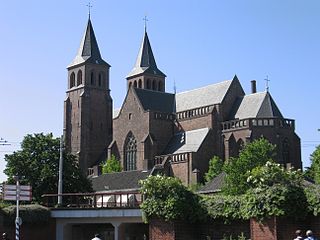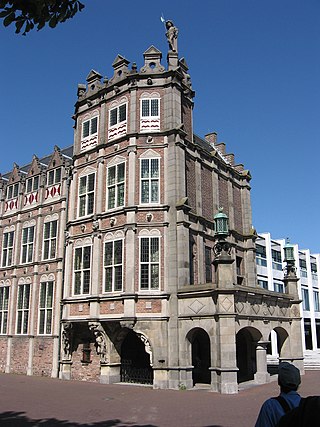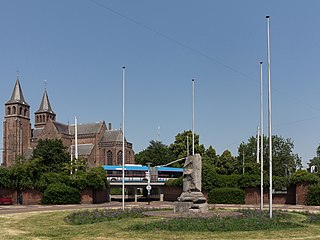27 Sights in Arnhem, Netherlands (with Map and Images)
Legend
Welcome to your journey through the most beautiful sights in Arnhem, Netherlands! Whether you want to discover the city's historical treasures or experience its modern highlights, you'll find everything your heart desires here. Be inspired by our selection and plan your unforgettable adventure in Arnhem. Dive into the diversity of this fascinating city and discover everything it has to offer.
Sightseeing Tours in ArnhemActivities in ArnhemPark Sonsbeek in Arnhem is the most famous park in this city. The park is named after Anna van Sonsbeeck, a prominent lady in the Arnhem community in the 17th century. Anna's father, Franciscus van Sonsbeeck, comes from the German town of Sonsbeck or Sonsbeeck. Above the main entrance of the Lutheran church in Sonsbeeck, built in 1655, you can still find the city's coat of arms: a sun with a few wavy lines underneath that represent a stream. The park is 67 hectares in size and borders the Zijpendaal and Gulden Bodem parks in the north. These three parks are closely linked and together cover about 200 hectares. To the east, Sonsbeek borders the Sonsbeekkwartier and St. Marten districts, to the south almost the city centre and to the west to the Burgemeesterswijk. The area is a protected cityscape.
John Frost Bridge is the road bridge over the Lower Rhine at Arnhem, in the Netherlands. The bridge was inaugurated after the end of World War II, and is named after Major-General John Dutton Frost (1912–1993), who commanded the British forces that reached and temporarily defended the pre-existing Rijnbrug at the same location during the Battle of Arnhem in September 1944. This was the bridge referenced in the 1977 Anglo-American film A Bridge Too Far, although the IJssel bridge in Deventer was used for the actual shooting of the film.
3. Nederlands Openluchtmuseum
The Netherlands Open Air Museum is a national open-air museum located in Arnhem. It focuses on the culture associated with the everyday lives of ordinary people, and demonstrating the old way of life in the Netherlands.
4. Burgers' Zoo

Royal Burgers' Zoo is a 45-hectare (110-acre) zoo in Arnhem, Netherlands, and is one of the biggest zoos in the country. Arnhem is a city that lies partially in the Veluwe, a nature park in the east of the Netherlands. The zoo is popular with both Dutch and German people, and receives about 1 million visitors annually. It was founded by Johan Burgers in 1913.
Wikipedia: Royal Burgers' Zoo (EN), Website, Twitter, Tiktok, Facebook, Instagram, Youtube
5. Castellum Meinerswijk
The castellum Meinerwijk was a fort in the Roman Netherlands, which was discovered during archaeological excavations in 1978 and later in 1991 in the floodplains of the Rhine near Meinerswijk near Arnhem. The castellum at Meinerswijk was probably built between the years 10 and 20 by the Roman general Germanicus on the south side of the Rhine. This wooden fort protected Roman shipping on the Rhine and possibly the Drusus moats, which had been dug from the Rhine to the north, were located here. In Roman times, the Oude IJssel flowed from Doesburg to the south to flow into the Rhine at the Castellum.
6. Sint Walburgisbasiliek
St. Walburga's Church is the oldest surviving church in Arnhem. The building has a characteristic double tower front on the west side. The church is built on the Count's Court and the residence of Reinald 1.
7. Luxor Live
Luxor Live, formerly Het Luxor-Théâtre and a cinema from 1915 to 1984, is the municipal music venue of Arnhem, located on Willemsplein, near Korenmarkt, in Arnhem. Luxor was previously privately owned. After years of vacancy, after closure due to violence by visitors, it has been revived as a music venue. It can accommodate 250 visitors in the small upper room and 750 visitors in the main hall.
8. Westerveldpark
Park Westerveld is a park in Arnhem-Zuid, originally an estate, laid out in the eighteenth century by the Tulleken family. It is bordered on the north side by the Drielsedijk, and on the south by a new housing estate of the village of Elden. In 2009, the park was designated a protected municipal monument.
9. Duivelshuis
The Devil's House or Maarten van Rossum House, on the Koningstraat in the center of the Gelderland capital Arnhem, is a city castle from the 16th century. It is called 'Devil's House' because of the satyr figures on the façade. The city castle houses the office of the mayor of Arnhem. After the Second World War, the cellars became a place of pilgrimage for veterans, relatives and other interested parties regarding the Battle of Arnhem.
10. Arnhem War Museum 40 - 45
The Arnhem War Museum 40-45 is a private museum dedicated to the Second World War, particularly in and around Arnhem. The museum was founded on 24 May 1994 by Eef Peeters. The museum is located in the former School with the Bible in Schaarsbergen and is organized as a foundation. It is not listed as a recognised museum in the museum register.
11. Park Gulden Bodem
Gulden Bodem, also known as the Gravinnenbos, is a park and former country estate in the Dutch city of Arnhem, located on the north side of the city. It has been a national monument since 2006. Due to its location, it is the overtuin of Zypendaal.
12. De Drie Haringen
The Three Herrings is the name of a medieval warehouse on the Rijnstraat in the Dutch city of Arnhem. The building was probably built by a member of the Cleaners' Guild. Guilds of that name carried a coat of arms that showed three pegs. The current façade dates from the beginning of the twentieth century, but contains seven older natural stone sculpted masks in the style of Hendrick de Keyser and a façade stone with three pegs. These culturally and historically valuable façade elements are registered as national monuments.
13. Huis Sonsbeek
Huis Sonsbeek, originally from 1744, is a country house in Arnhem's Park Sonsbeek located on a hill overlooking the city of Arnhem. The middle part was built for the young orphaned Adriana van Bayen (1723-1755?) to a design by the Arnhem architect Anthony Viervant and probably enlarged with the side wings at the end of the eighteenth century by his son Roelof Roelofs Viervant. The building, which has had various uses in the past, is often called "De Witte Villa" or "Stadsvilla Sonsbeek" locally because of the white façade, which used to have other colors.
14. Nederland Watermuseum
The Dutch Water Museum in Arnhem is the museum that focuses on information about all aspects of (fresh) water, such as water management, drinking water and water purification. The museum was opened in 2004.
15. International Memorial for the Unknown Child
The International Monument for the Unknown Child is a monument located on the Delhuyzen National Scattering Ground in the municipality of Arnhem, just outside the Veluwezoom National Park. It is a collection of man-sized stones. In the middle of the collection of stones is a colorful glass artwork by artist Cobi van de Kuit, which represents a rose. The status of the monument (2020) is that it is not yet 'finished', it is 'growing'. Large stones are regularly added.
Wikipedia: Internationaal monument voor het onbekende kind (NL), Website
16. voormalig Evangelisch-Lutherse kerk
The Evangelical Lutheran Church was a church in the Dutch city of Arnhem where believers of the Evangelical Lutheran congregation gathered. The church was built around 1898 to a design by architect A.R. Freem and took over the celebrations of the previous church, the Lutheran Church on the Korenmarkt. The building was built in neo-Gothic style and designed as a hall church. The choir of the church is oriented towards the choir of the nearby St. Martin's Church. The church is a national monument.
17. Airborne monument
The Airborne Monument in the Dutch city of Arnhem is a monument on the Airborne Square in memory of the Battle of Arnhem in September 1944. It consists of a column of the former Palace of Justice in Arnhem that was damaged by the war and has been placed on a pedestal. During the battle of Arnhem in September 1944, the courthouse was completely destroyed. A fragment of one of the columns was preserved as a reminder of the war and now forms the monument. On 17 September 1945, the monument was unveiled by the Queen's Commissioner, mr. Schelto baron van Heemstra. On the column is the date in gilded letters: 17 September 1944.
18. De Arnhemse Schipbrug
The Arnhem Ship Bridge was a pontoon bridge in Arnhem over the Lower Rhine. The ship bridge was located west of the city on the spot where the Nelson Mandela Bridge is located today. It provided the most important connection across the Rhine until the construction of the Rhine bridge in 1935.
19. Sint-Petersgasthuis
The Sint Petersgasthuis is a former hospital in the Dutch city of Arnhem. The building was built around 1354 on the Rijnstraat and served as a residence and a mint in the first years. In 1407 the building was used as a guest house.
20. Immerloopark
The Immerloopark or Immerloo is a park in Arnhem on the south bank of the Immerlooplas. Park Immerloo was built between 1969 and 1972, making it the first city park in the Arnhem-Zuid district. In addition to a natural function, it also has a recreational function. The name Immerloo comes from a farm called Jammerloo, where the landkeeper used to live, the landowner's steward.
21. Lutherse Kerk
The Lutheran Church is a former Lutheran church building on the Korenmarkt in the Dutch city of Arnhem. The church was built on the site where the Bontenburch house had stood until then. In this house, which became increasingly dilapidated, Lutheran religious meetings had been held since 1657. In the period 1735 - 1737, the hall church was built in classicist architectural style according to the presumably design of the Arnhem architect Leendert Viervant the Elder. The façade is set up according to the Ionic architectural style with a large pediment at the top. It features decorations in the Louis XIV style. The capital rests on columns that have been imitated around the building. Above the entrance is an image of a swan as a sign of the Lutheran faith.
22. Spinnenkopmolen (Gorredijk)
The spinnenkop of the Netherlands Open Air Museum in Arnhem is a small drainage mill originally located near Gorredijk, Friesland, Netherlands. It is a hollow post windmill that has been restored to working order.
23. Belvedère
The Belvedere in Sonsbeek Park is a lookout tower in Sonsbeek Park in Arnhem. The belvedere was built in the 19th century by order of Baron H.J.C.J. van Heeckeren van Enghuizen. Baron van Heeckeren had become the owner of Park Sonsbeek in 1821.
24. Presickhaeffs Huys
The Presickhaeffs Huys is a medieval house in the center of Arnhem on the Kerkstraat, which according to research was built in the year 1354. In 1555 a T-shaped extension took place at the rear with a beautiful courtyard; from 1606 the Nassauch Widows' Home moved into the building. Then in 1795 it was a tea house and from 1915-1944 a café with meeting rooms. Partly due to the many destructions that were caused in the center of Arnhem during the Battle of Arnhem in the Second World War, this is one of the few medieval houses that Arnhem still possesses. The house, near St. Eusebius' Church, had its own courtyard. Previously, the house extended to the Koningstraat behind it. The building is a national monument.
25. Jubileumpark
The Jubilee Park is a park in the south of the Dutch city of Arnhem. It is located between the De Laar Oost district and the A325. The park is a gift from the citizens of Arnhem on the occasion of the city's 750th anniversary in 1983.
26. Casa Bianca
Casa Bianca is a house in the Dutch town of Arnhem that was built in the early 20th century as a service residence for the poultry and cow caretaker of the Brantsen family, who lived in Huis Zijpendaal. The white house stands in a wooded area in a line of sight on the Zijpendaal House. The floor plan of the house is of a T-farm, with the front house having a hipped roof and the rear house a wolf roof. The larger windows have a brick frame at the top. The lower part of the window, which can be opened as a sliding window, can be sealed by characteristic black and white shutters.
27. Nationaal Brandweermonument

The National Fire Brigade Monument is a memorial in the Dutch town of Schaarsbergen in memory of firefighters who have died in the line of duty since 1945. The monument was designed by Jeroen Doorenweerd and unveiled on 16 June 2012.
Share
How likely are you to recommend us?
Disclaimer Please be aware of your surroundings and do not enter private property. We are not liable for any damages that occur during the tours.




















.jpg)



